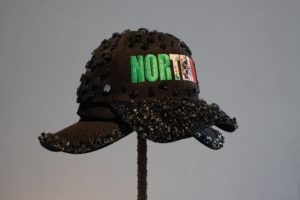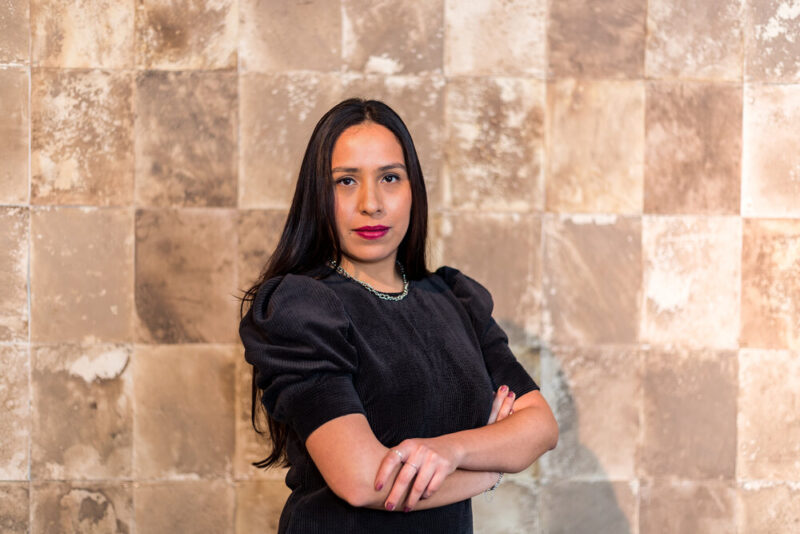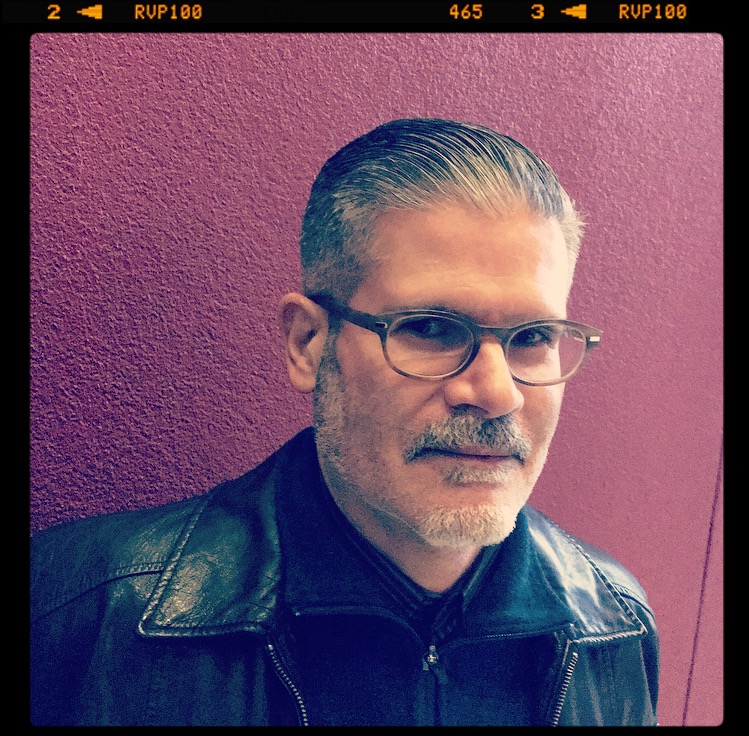
Past Event
Artist Conversation for Sigo Tumbado, Sigo Coronando with Verónica Gaona (2022/2023 Artist Studio Program) & Roberto Tejada
About the Exhibition
In Sigo Tumbado, Sigo Coronando, Verónica Gaona explores characteristics of transnationality, impermanence, and monumentality across international borders. By using trokiando aesthetics, Gaona reveals spatial practices of migrant families and the desire to concretize immortal significance. Gaona employs her iconic Ford F-150 truck, burn out marks, polarized tinted window glass, aluminum images, and vinyl to resolve fragmented memories, subvert systems of power, and solidify a place of belonging in the Mexican landscape.
“If we reflect on traditional monuments, which are Eurocentric, emphasize solidity, have weight, have a sense of permanence, and are usually visible, then truck ephemera can be used and assembled as an alternative social/cultural monument that commemorates migrant labor, but at the same time depicts the consequences of dispersing family members across geographies for a better future.”-Verónica Gaona
About the Artist
Verónica Gaona is an artist from Brownsville, TX, a city along the South Texas-Mexico border landscape. Gaona received a Master of Fine Arts in Studio Art from the University of Houston and a Bachelor of Arts in Mass Communication from The University of Texas Rio Grande Valley. She has been the recipient of the national Artadia Award and the Chispa Award by The US Latinx Art Forum. In 2022, Gaona participated in Monumentality in Art: Memory, History, and Impermanence in Diaspora panel at the College Art Association conference in Chicago and participated in the Engaging Latinx Art: National Endowment for the Humanities Summer Institute at the Museum of Fine Arts Houston. Currently, she is an Adjunct Professor at the University of Houston. Verónica Gaona is represented by Presa House Gallery in San Antonio, Texas.
About The Mediator
Roberto Tejada is the author of poetry collections that include Why the Assembly Disbanded (Fordham, 2022), Full Foreground (Arizona, 2012), Exposition Park (Wesleyan, 2010), and Mirrors for Gold (Krupskaya, 2006). His book Still Nowhere in an Empty Vastness (2019) is a Latinx poetics attuned to colonial settlements and cultural counter-conquest; intersections of history and metaphor in art and writing of the Americas.
A translator, editor, essayist, art historian, and cultural critic Tejada’s writing addresses the political imagination and impurity of time in shared image environments; configurations of art, life, and language inclined to the future. His multifaceted creative practice and critical inquiry have been recognized with numerous fellowships and grants including awards from the National Endowment for the Arts, the Fulbright Foundation, Creative Capital Warhol Foundation, Fundação Armando Alvares Penteado (São Paulo, Brazil), as well as The Sterling and Francine Clark Art Institute and the Oakley Center for the Humanities and Social Sciences, Williams College.
Tejada lived in Mexico City (1987-1997) where he worked as an editor of Vuelta magazine, the cultural monthly published by the late Nobel laureate Octavio Paz, and as executive editor of Artes de México, a quarterly detailing pre-conquest to contemporary Mexican art. He founded the multi-lingual literary journal Mandorla: New Writing from the Americas. Co-edited with Kristin Dykstra and Gabriel Bernal Granados, the publication featured innovative writing in its original language—English or Spanish—and high-quality translations of existing material, together with visual art and other forms of critical inquiry. All sixteen issues of the journal, together with a compilation of photographs, letters, and other related materials, are available in digital form at Northwestern University’s Open Door Archive.
[https://opendoor.northwestern.edu/archive/items/browse?collection=16]
He has taught at the National Autonomous University of Mexico (UNAM), Dartmouth College, University of California San Diego, University of Texas Austin, SMU Meadows School of the Arts, Naropa University’s Summer Writing Program, and the Milton Avery Graduate School of the Arts at Bard College. Committed to poetics and open sites of cultural inquiry—regional, transnational, and diasporic—Tejada’s research and creative interests involve the language arts and image worlds of Latin America, especially Mexico, Brazil, the U.S.-Mexico Borderlands, and other sites of U.S. Latinx cultural production.



